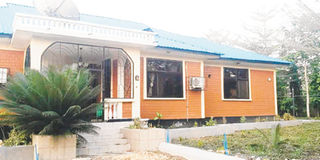Building study findings gather dust

This house has been built using interlocking bricks. Although the National Housing and Building Research Agency has conducted studies on reducing costs of house construction it is unable to disseminate them due to financial woes. PHOTO|FILE
What you need to know:
- This comes at a time when a study by the Dar es Salaam-based Mikono Speakers International - a multispectral consulting firm in Africa – shows that buying a house in Tanzania is more expensive than constructing a new one and as a result, out of the 430 respondents, 64 per cent rented houses instead of owning them.
Dar es Salaam. The National Housing and Building Research Agency (NHBRA) has conducted several researches that would help Tanzanians to build houses affordably yet the same has not been disseminated due to a lack of funds, the agency has said.
This comes at a time when a study by the Dar es Salaam-based Mikono Speakers International - a multispectral consulting firm in Africa – shows that buying a house in Tanzania is more expensive than constructing a new one and as a result, out of the 430 respondents, 64 per cent rented houses instead of owning them.
The NHBRA is now calling on the government to release enough funds allocated for its annual budget to enable it implement a majority of its target.
“We have been coming up with new technologies that will enable Tanzanians to build houses at affordable costs but due to lack of funding we are not able to take our research findings to the public,” the NHBRA acting business support manager, Ms Hadija Maloya told BusinessWeek.
During the current financial year, she said, the agency has been allocated a total of Sh721 million but until the end of the first quarter of the 2016/17, only Sh29 million has been released.
Similarly, the agency was allocated a total of Sh800 million during the 2015/2016 financial year but until the end of the, it received only Sh442 million.
NHBRA researches have proved that alternative building materials – which are cost effective - can also produce a standard and quality house.
“For our clients who cannot afford to build a modern house, we advise them to build a house using alternative building materials including a resilient foundation by using materials found on site including soil or even gravels,” she said.
Some of the technologies introduced the use of interlocking bricks that are cost effective for building walls compared to conventional materials. They have also come up with the of rim beam
channel instead of woods that have enabled builders to reduce cost of construction for up to 40 per cent. The agency also offers advice on the cost-effective finishing materials which include using usual normal materials like wood for windows or aluminium windows, and cement for floors or tiles.
Ms Maloya however noted that attaining a quality house at a cost of between Sh20 million and
Sh25million could prove challenging especially as there are a number of things to consider including cost of buying land, valued added tax on materials and other necessary services like electricity and water.
Recently the minister of Land, Housing and Human Settlements Development, Mr William Lukuvi, directed municipal councils to set aside lands to enable the government through the National Housing Corporation build low cost houses for low income earners.
NHC head of corporate public affairs and CSR Susan Omari was quoted as saying that they were in plans to start construction of low cost houses that would be sold for a maximum of Sh25 million.




